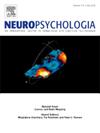Behavioral and electrophysiological evidence for preserved specific associative episodic memory in older adults
IF 2
3区 心理学
Q3 BEHAVIORAL SCIENCES
引用次数: 0
Abstract
Aging is often linked to a decline in associative memory. Prior research has shown that older adults have difficulty retrieving specific associative memory but can retrieve gist associative memory when deliberately differentiating test pairs with different levels of specificity during associative recognition. In this study, we utilized the context reinstatement paradigm to examine whether older adults could retrieve specific memory in situations where associations do not necessarily need to be voluntarily retrieved. Thirty-five older adults were directed to intentionally link objects with unique background scenes during encoding. Subsequently, test objects were presented against either the reinstated or similar background scenes during a recognition memory task, where participants were required to identify whether the objects were old or new regardless of their background contexts. Event-related potentials (ERP) were recorded to uncover the electrophysiological correlates of specific associative episodic memory. Behavioral results revealed higher memory sensitivity for object recognition when the background scenes were reinstated than when those were similar in older adults. ERP results indicated that older adults exhibited a more prominent fronto-centrally distributed positivity during object recognition in the reinstated than in similar contexts. Our results suggest that older adults may preserve their ability to retrieve specific memory for associations through an involuntary, spontaneous recollection process, which holds important theoretical implications for age-related associative memory deficits.
行为学和电生理学证据表明,老年人的特定联想外显记忆得以保存。
衰老往往与联想记忆的衰退有关。先前的研究表明,老年人很难检索特定的联想记忆,但在联想识别过程中有意区分不同特定程度的测试对时,却能检索要点联想记忆。在本研究中,我们利用情境恢复范式来考察老年人是否能在不一定需要自愿检索联想的情况下检索特定记忆。我们指导 35 名老年人在编码时有意将物体与独特的背景场景联系起来。随后,在识别记忆任务中,测试对象与恢复的或相似的背景场景同时出现,参与者需要识别对象是新的还是旧的,而不管其背景是什么。研究人员记录了事件相关电位(ERP),以揭示特定联想记忆的电生理相关性。行为结果显示,当背景场景恢复时,老年人识别物体的记忆灵敏度比背景场景相似时更高。ERP结果表明,与类似背景相比,老年人在恢复背景的物体识别过程中表现出更突出的前中心分布阳性。我们的研究结果表明,老年人可能会通过一种非自愿、自发的回忆过程来保持检索特定联想记忆的能力,这对与年龄相关的联想记忆缺陷具有重要的理论意义。
本文章由计算机程序翻译,如有差异,请以英文原文为准。
求助全文
约1分钟内获得全文
求助全文
来源期刊

Neuropsychologia
医学-行为科学
CiteScore
5.10
自引率
3.80%
发文量
228
审稿时长
4 months
期刊介绍:
Neuropsychologia is an international interdisciplinary journal devoted to experimental and theoretical contributions that advance understanding of human cognition and behavior from a neuroscience perspective. The journal will consider for publication studies that link brain function with cognitive processes, including attention and awareness, action and motor control, executive functions and cognitive control, memory, language, and emotion and social cognition.
 求助内容:
求助内容: 应助结果提醒方式:
应助结果提醒方式:


